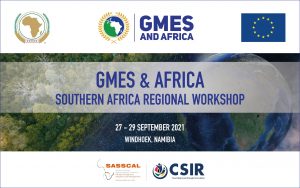
The Southern African Science Service Centre for Climate Change and Adaptive Land Management (SASSCAL) in collaboration with the Council for Scientific and Industrial Research (CSIR) will hold a Hybrid GMES and Africa Regional workshop from 27 – 29 September 2021, at Safari Hotel in Windhoek, Namibia.
The Global Monitoring for Environment and Security and Africa (GMES & Africa) Initiative is a programme formed out of mutual cooperation between Africa and Europe with a focus on Earth Observation (EO) systems. It was formed to respond to the global need to manage the environment, understand and mitigate the effects of climate change and ensure civil security by providing information to policymakers, scientists, private sector and the public.
GMES and Africa aims to promote development of local capacities, institutional, human and technical resources for access to and exploitation of Earth Observation (EO) based services on an operational basis for sustainable development in Africa.
In its first phase, GMES has funded 13 consortiums in Africa.
SASSCAL-led consortia is implementing the Wetland Monitoring and Assessment Service for Transboundary Basins in Southern Africa (WeMAST) Project while CSIR is leading the Marine and Coastal Operations for Southern Africa (MARCO-South).
SASSCAL Members of the consortium include the University of Botswana, University of Zambia, Cape Peninsula University of Technology, University of the Western Cape and Midlands State University, South African National Space Agency (SANSA) and the National Remote Sensing Centre (NRSC) of Zambia.
CSIR led consortium includes ABALOBI, Benguela Current Convention, Coastal Oceans Research and Development in the Indian Ocean, Council for Scientific and Industrial Research, National Sea Rescue Institute, University of Dar Es Salaam, University of Eduardo Mondlane and the Western Indian Ocean Marine Science Association).
The workshop will provide an opportunity to promote and encourage mutual exchanges in terms of sharing best practices, knowledge and experiences as well as allow for the exchange of information and knowledge on new and innovative Earth Observation technologies developed under the programmes and their alignment with the region’s sustainable development strategies.
The workshop will also reveal trends in the use of earth observation data to monitor and assess wetland conditions, threats to sustainable utilisation of wetland resources as well as updating stakeholders on how climate change variability and drought is continually affecting Sub-Saharan Africa’s surface water resources.
The workshop’s envisaged outcomes will be to ensure shared knowledge and understanding of the new and innovative Earth Observation technologies, and their application to society.
Expected to visit is a broader pool of international delegates from the two continents (Europe and Africa) both physically and virtual. This includes the member countries policy makers, line ministers from the SADC countries, public and private sector stakeholders, implementers, Basin Commissions, researchers, and any other stakeholders whose activities are related to coastal areas, rivers, and their ecosystems.
For more information and to register visit https://gmes-sarw.sasscal.org/




